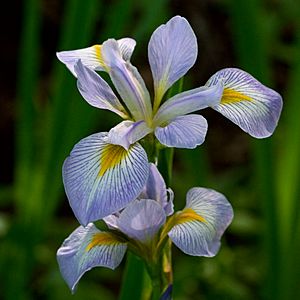Iris virginica facts for kids
Quick facts for kids Iris virginica |
|
|---|---|
 |
|
| Scientific classification |
|
| Kingdom: | Plantae |
| Clade: | Tracheophytes |
| Clade: | Angiosperms |
| Clade: | Monocots |
| Order: | Asparagales |
| Family: | Iridaceae |
| Genus: | Iris |
| Subgenus: | Iris subg. Limniris |
| Section: | Iris sect. Limniris |
| Series: | Iris ser. Laevigatae |
| Species: |
I. virginica
|
| Binomial name | |
| Iris virginica |
|
| Script error: The function "autoWithCaption" does not exist. | |
| Synonyms | |
|
|
Script error: No such module "Check for conflicting parameters".
The Virginia iris (scientific name: Iris virginica) is a beautiful flowering plant. It grows year after year, which means it's a perennial. This plant is originally from eastern North America.
You can often find it growing along the coastal plain. This area stretches from Florida all the way to Georgia in the southeastern part of the United States.
The Virginia iris is also famous in the world of science! It's one of three Iris species used in a special collection of plant data. This data set was created by a scientist named Ronald Fisher in 1936. He used it to show how to analyze different measurements of plants.
Contents
What the Virginia Iris Looks Like
The Iris virginica is a plant that comes back every year. It has 2 to 4 leaves that stand up straight or arch over. These leaves are bright green and shaped like a spear. They are flattened at the bottom.
Leaves and Roots
The leaves are about 1–3 cm (1⁄2–1+1⁄4 in) wide. Sometimes, they can be even longer than the flower stalk. The plant also has thick, fleshy roots. These roots are called rhizomes. They spread underground and are about 1–2 cm or 1⁄2–3⁄4 in thick.
Flowers and Seeds
The flowers of the Virginia iris have a light smell. Each flower is about 4 cm or 1+1⁄2 in long and 7 cm or 2+3⁄4 in across. They have 3 parts that hang down, called "falls" (these are actually sepals). They also have 3 parts that stand up straight, which are the petals.
The petals and sepals can be many different colors. They range from a deep violet to a pinkish-white. The "falls" usually have a splash of yellow or yellow-orange in the middle.
Each plant can have 2 to 6 flowers. They bloom from April to May. These flowers grow on a single, straight stalk that is about 30–90 cm (12–35 in) tall. The stalk might have branches and can look a little bit zigzag. After the flowers, the plant grows brown seeds. These seeds are found inside fruit capsules that have three parts. The capsules are about 3–6 cm or 1+1⁄4–2+1⁄4 in long and 1–2 cm or 1⁄2–3⁄4 in wide.
Traditional Uses of the Virginia Iris
The Virginia iris has been used for a long time by Native American tribes. The Cherokee people, for example, have used this plant as a medicinal plant. They use it in their traditional healing practices.
Cherokee Uses
The root of the plant is often pounded into a paste. This paste is then used as a salve. A salve is like a healing cream that is put on the skin.
The Cherokee also make a special liquid from the root. An infusion (like a tea) made from the root is used to help with problems of the liver. A decoction (a stronger liquid made by boiling the root) is used to treat "yellowish urine."
Seminole Uses
The Seminole people may also have used this Iris species. They traditionally used it for healing after someone experienced a severe shock or injury.
See also
 In Spanish: Iris virginica para niños
In Spanish: Iris virginica para niños
 | Chris Smalls |
 | Fred Hampton |
 | Ralph Abernathy |

